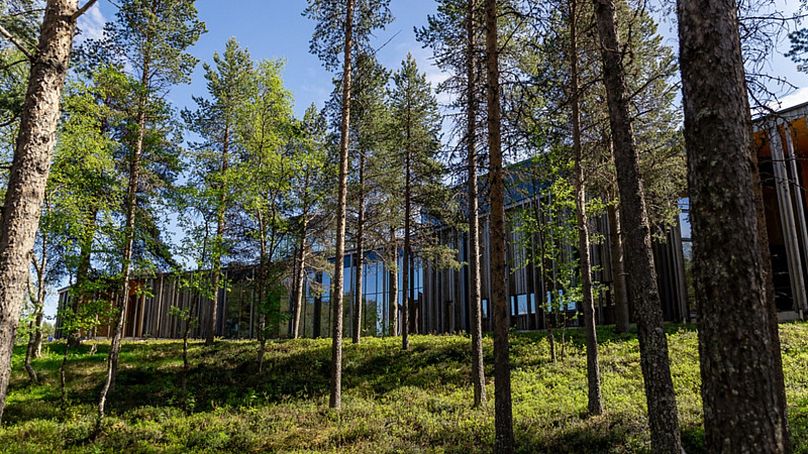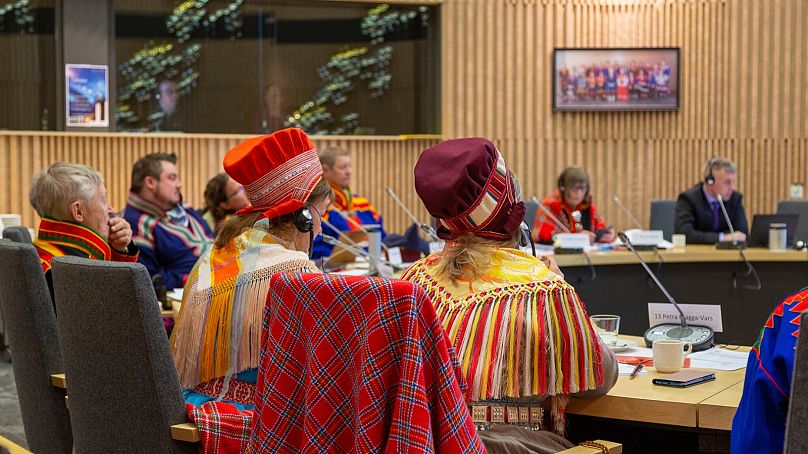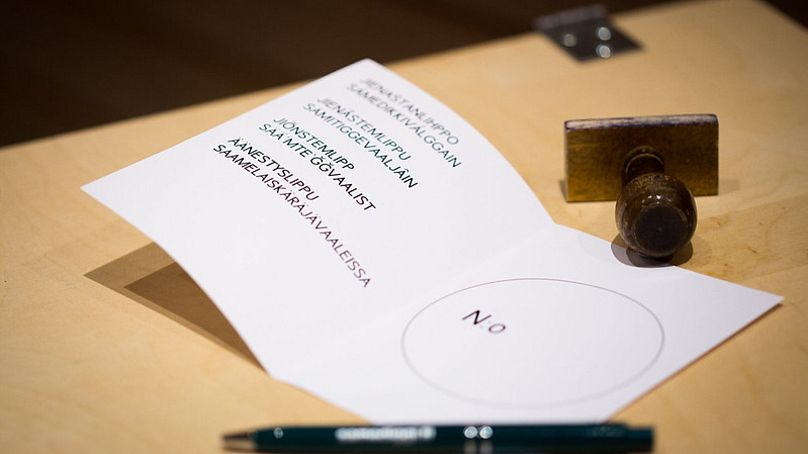With no dedicated government minister or national representation, the Sámi Parliament in Inari is an important body for Sámi people, despite its limitations.
The European Union's only recognised indigenous people go to the polls from Monday, in a vote to elect 21 members of the Sámi Parliament in Inari, Finland.
 ADVERTISEMENT
ADVERTISEMENT
 ADVERTISEMENT
ADVERTISEMENT
The month-long election process comes just months after former Prime Minister Sanna Marin's government failed to pass key human rights reforms before the end of the last parliamentary session, a lingering sore point in relations between the traditional Sámi homeland area - known as Sápmi - and the capital Helsinki.
With no dedicated minister for indigenous affairs, scant representation in parliament and no elected MEPs in Brussels, Sámi parliamentarians must make the most of their limited powers and voices to raise local, often sensitive, issues to the government, which has been described as "indifferent" to Sámi issues by one candidate.
"Of course the Sámi right to self-determination is recognised in international law, even though the country, Finland, does not fully implement it," explains Anni-Sofia Niittyvuopio, who at 24 is the youngest candidate in this year's election race.
Finland has been routinely criticised by the United Nations, which found in 2022 the Nordic nation violated an international convention on racial discrimination when it comes to the political rights of Sámi people.
"I am a candidate because there is still hope for our self-determination," Niittyvuopio tells Euronews.
"There are a lot of things the Sámi Parliament can have an impact on, like education, supporting Sámi views and culture and language through the Youth Council, and land use - even if the Finnish government doesn't have to listen," she adds.
Established in 1996 the Sámi Parliament in Inari receives much of its core funding from the Finnish central government, but acts independently to represent the views and will of the Sámi people in Sápmi in areas like education, language, and culture.
It also offers positions on issues such as development, land use, and exploitation of natural resources which might impact the traditional Sámi way of life.
Campaigning in Lapland's vast wilderness
For candidates in the election, who run as individuals rather than on a party ticket, campaigning across the vast wilderness of Lapland might not be as difficult as it sounds.
The election itself comes during somewhat of a lull in the calendar of traditional life in Sápmi. For now, there is still fishing in the lakes and rivers, people gathering berries and mushrooms, and hunting season just started.
But a month from now when voting ends, the community will hit its busiest period bringing all the reindeer from the forests and fells, and corralling them for slaughter or sale before releasing them again for winter.
"Campaigning here is different of course, we have a lot smaller population who is voting" - around 6,000 people are eligible - "but people know each other and we go to social gatherings for example at the Ijahis idja Festival in Inari there were a lot of candidates," explains Anni-Sofia Niittyvuopio, who works as a reindeer herder, and also organises cultural events for young people.
"It's much more about seeing people day-to-day and connecting through social media. If you are active in the community your work is quite seen already so you don't have to actually prove what you are doing and remind people you are a candidate and why you would be the right person to vote for," she says.
Political apathy outside the traditional homeland
One of the biggest issues facing the next Sámi Parliament is political engagement outside the traditional homeland area.
Most Sámi people in Finland now live outside Sápmi. They're known as 'City Sámi' and at the last election in 2021 just 41.3% of them voted.
But even though the majority of voting Sámi are now City Sámi, they don't have guaranteed representation in the 21-member parliament, unlike four of the traditional constituencies - Enontekiö, Inari, Sodankylä and Utsjoki, the EU's most northerly political constituency - which are guaranteed three spots in the parliament each.
This formula ensures the majority of representatives in the parliament actually live in Sápmi.
Candidate Janne Hirvasvuopio lives in the southern city of Espoo, but has his roots in the north.
"It's extremely hard to get people out to vote, I admit, because there is political apathy in the cities. The Finnish media is also not very interested in these elections, but I think it should be a political goal to have at least one guaranteed seat in parliament from outside the Sápmi area," to help improve political engagement within the City Sámi community, Hirvasvuopio tells Euronews.
Access to early childhood education in Sámi languages has been a challenge for many City Sámi people, with a 'language nest' model of learning proving successful for pre-schoolers, but over-subscribed and under-resourced.
As a 'Rainbow Sámi' LGBTQ candidate, Hirvasvuopio attended Sápmi Pride this summer, and describes himself as "a minority within a minority" who hopes to help queer people in Sápmi with the issues they face in traditional, often conservative communities.
"I think it is very necessary to have connections to the homeland, like my home village of Vuohčču, even if you live in the cities," he says.
"But still we are one community, even if we have our own smaller communities too."













